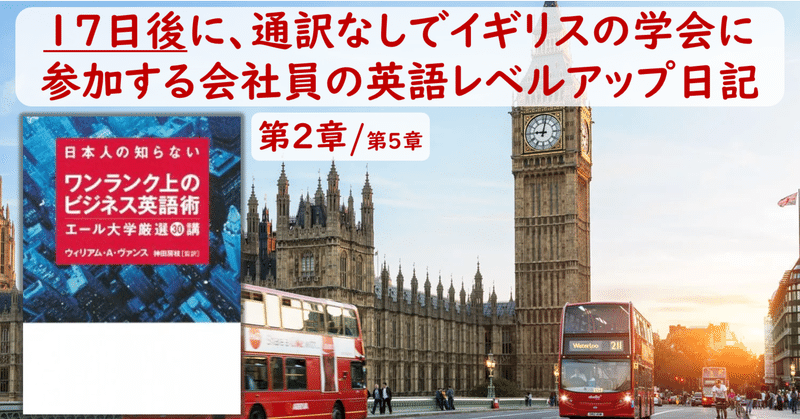
ビジネス英語のNGワード:I'm too busy. I don't know. I can't~(+素敵な会話の締め括り方)
読書ノート(172日目)
今月の読書テーマとしている
「英語」について、
今日もこちらの本を紹介します。
※なぜ私が英語力を高めたいのか??
という背景はこちらをご覧ください🙇♂️
著者のウィリアムさんは、エール大学で
ビジネススクール・コミュニケーションの
ディレクターとして教鞭をとっておられ、
英語コミュニケーションに定評がある方
との紹介がされていました。
初版発行は2011年と13年前ですが、
きっと言い回しはそこまで古くないだろう
と思い、参考にしてみようと思います。
(最後に気になった英語のフレーズについて、
ChatGPTで古くさくないかどうかを
確認してみようと思います)
ということで、こちらの本は
以下の全5章で構成されています。
第1章:日本人の知らない意外な常識
第2章:相手の心理をつかむ英語コミュニケーション
第3章:今すぐできる少しの工夫で絶大な効果を得る
第4章:さあ、とんでもない誤解を解こう
第5章:ビジネスパーソンからプロフェッショナルへ
今日はその中での第2章です。
・第2章:相手の心理をつかむ英語コミュニケーション
・気をつけるべき、I'm too busy.
・上司や同僚からの頼まれ事に対して、I’m too busy.と返答することは
あなたの依頼はそれほど重要ではない、他により重要なことがある。
と自己中心的な印象を与えかねない
・I have no time. や It’s been busy.も同様のニュアンスを与えてしまう
・この場合に望ましいのは「相手のために自分はいつ時間が取れそうか」と
いう姿勢を示すこと。その上で、「ただ忙しい」と言って断るのではなく
一歩踏み込んだ説明をすることが大切
・回答例
I’ve already committed myself to something.
(私は既に他の約束があります)※既に他の予定が入っている場合
Let me get back to you with the answer in a few days.
(数日中に回答の連絡をさせてください)※即答ができない場合
・能ある鷹は誉め言葉を上手に受け止める
・例えば、上司の前でスピーディーに暗算して回答した際に
Wow, that was fast! You’re so good with numbers.
(君は数字に強いんだね!)
と褒められた際にどう応答するとよいだろうか
・Oh, no, that was nothing.(大したことではないです) と謙遜したり、
Yeah, I’m a math genius.(ええ、数学の天才なのです)と
自信満々に応えることはお勧めしない
・相手に敬意を表しながら上手に誉め言葉を受け取る応答例
Thank you for the compliment!
I’ve always enjoyed doing math problems.
(褒めて頂きありがとうございます。
私は数学の問題を解くのが好きなのです)
・他にも、自分の仕事を褒めてもらったときの応答例として、
I appreciate your positive feedback. I enjoyed working on it.
(ポジティブなご意見ありがとうございます。楽しんで取り組めました)
・他にも、新しい髪形を褒めてもらったときの応答例として、
Thank you for saying that. I’ve just had it done for summer.
(そう褒めてくれてありがとう。夏だからこうしてみたんだ)
・相手が褒めてくれたことを素直に受け入れないことは、
相手の評価基準、感性、嗜好などを侮辱することにもなりかねないため、
特に親しい関係でない限りは避け、素直に受け入れる方が良い
・Noと言わない力で洗練された大人の英語コミュニケーションを
・相手の主張に対して反論する際
・Yes, that may be true, but…
・Well, I can see your point, but…
・I see what you mean, but…
・I don’t know. は自分に全く知識がなく調べようもないときの強い否定表現
・調べれば何とか分かるときは、
I’m not sure~ や I’m unsure, but… を使うと良い
(例)I’m unsure, but let me find out.
(私は不確かですが、調べさせてください)
・I can’t は、ビジネスにおいて最も問題視され、
誰も聞きたくない応答のトップにいつも挙げられるので要注意!
・以下の2つはどちらも会議に出席できないことを意味しているが、
聞き手の印象はかなり違う
(A) I can’t attend the meeting.
(B) I’m unable to attend the meeting.
・(A)は厳しい環境に置かれた犠牲者で自分の責任をコントロールできない
という響きがあり、(B)は自らの義務や責任は管理しながらも、
より重要度の高い用事のために会議に出席できない印象を与える
・I can’t の代替表現:be unalbe to~、difficult
・I can’t find your email.
→ I’m having difficulty finding your email.
・He can’t understand you.
→ It’s difficult for him to understand you.
・第一印象よりも磨きをかけるべき、会話の締めくくり方の6ステップ
Step1:会話を締めくくるシグナルを出す
Well,~ や So, ~を、"長めに発音"して会話を切り出す
Step2:相手の名前を効果的に使い相手への丁寧さや親しみを意識的に表現
Step3:話せてよかったという気持ちを告げる
スタンダード版:Well, Laura, it’s been really nice speaking with you.
カジュアル版:So, I’ve enjoyed chatting with you, Mark.
フォーマル版:Well, Mr. White, I’m delighted we had this chance to talk.
さらに好印象な表現:
I especially enjoyed hearing about your interest in art [work / trip / family].
Step4:言い訳を加える
I should be getting back to work [heading home / catching my train].
Oh, I just noticed my boss [colleage / friend], and I should say hello.
Step5:もっと話したい気持ちを表現する
I hope we have a chance to speak again sonn.
Maybe we’ll have a chance to talk more the next time we meet.
Step6:最後にポジティブな一言を添える
It was nice to meet you!(※初対面の場合)
It was so good to see you!(※再会した場合)
なるほど…!
第2章で学んだビジネス英語の
個人的な私見での3大NGワードは…
I'm too busy.
I don't know.
I can't~
でした。
英会話の途中で言葉に詰まって
しまったときに、ついつい
言ってしまいそうなので、
とっさのタイミングでも言えるように
望ましい回答例を覚えておきたい…!
I’ve already committed myself to something.
I’m unsure, but let me find out.
It’s difficult for me to~
また、オンライン英会話に限らずですが、
レッスンの最後の締めの挨拶について
もっと良い言い方を探していたので
本書で紹介された以下の一連の流れは
そのまま暗記して使えそう!
と思いました。
・会話の締めくくり方:6ステップの一連の流れ
Well, John, it’s been really nice speaking with you.
I especially enjoyed hearing about your work at the newspaper.
But I need to see a few more people before it gets too late.
Maybe we’ll have a chance to talk more later. It was great to meet you!
(ところでジョンさん、あなたとお話でっきて本当に良かったです。
特にあなたの新聞社でのお仕事に就いてのお話は楽しかったです。
ですが、あまり遅くならないうちに私は他の人たちにも
お会いしなければと思います。おそらく後ほどもっとお話しする機会が
あるでしょう。お目にかかれて嬉しかったです)

ということで、第2章は
ビジネスでの3大NGワードや
会話の締めの挨拶文など
盛りだくさんの内容でした。
では今日はこの辺で!
皆さんも良い日曜日をお過ごしください。
それではまたー!😉✨
NG words in business English: I'm too busy. i don't know. i can't~
(+ nice way to end a conversation).
Reading Notebook (Day 172)
For this month's reading theme on English, here is another book for you today.
The author, William-san, taught at Yale University as Director of Business School Communication and was introduced as someone with a reputation for English communication.
The first edition was published 13 years ago in 2011, but I am sure the phrases are not that old and I will try to refer to it. (Finally, I'm going to check the English phrases I'm interested in on ChatGPT to see if they aren't out of date.)
So the book here consists of the following five chapters.
I see..!
The three biggest NG words in my personal opinion in business English that I learnt in Chapter 2 were...
I'm too busy.
I don't know.
I can't~.
These are the three most common words I tend to say when I'm stuck in the middle of an English conversation, so I'll remember examples of desirable responses so that I can say them at a moment's notice.
I've already committed myself to something.
I'm unsure, but let me find out.
It's difficult for me to~
I was also looking for a better way to say the closing greeting at the end of an online English lesson, so I thought the following sequence of steps introduced in this book could be memorised and used as is! I thought.
So, Chapter 2 was three NG words in business English and closing greetings for conversations.
Well, that's all for today!
I hope you all have a great Sunday.
See you soon! 😉✨
この記事が気に入ったらサポートをしてみませんか?
